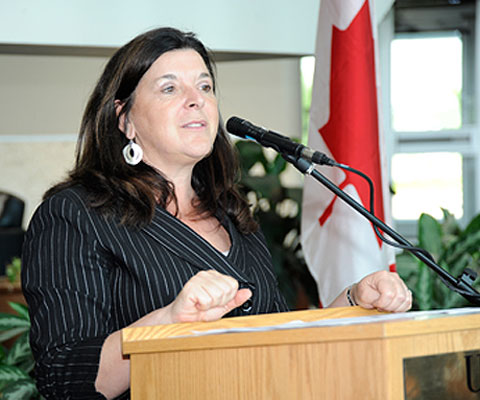When universities go global, everyone benefits

This article was published in Embassy on December 10, 2014.
By Vianne Timmons, president, University of Regina, and chair, AUCC’s Standing Advisory Committee on International Relations
When I was growing up in a small mining community in Labrador in the 1960s and ’70s, the idea of moving to another country to study never occurred to me. Thankfully, times have changed. Young people today have a far greater knowledge than I did that such opportunities exist, and as President of the University of Regina, I now have the privilege of seeing many young Canadians seize the opportunity to study abroad.
I am always struck by the bravery and courage of these students. I vividly remember leaving home to attend university in a neighbouring province, and how overwhelmed, scared and excited I was. I can only imagine how these feelings would be intensified by moving to another country and being immersed in a new language and culture. But it’s a transformative experience, and students know it will do a great deal to prepare them for the workplace of today and tomorrow.
Access to international opportunities reflects the high priority and increased focus universities are placing on internationalization. New survey results released by the Association of Universities of Colleges of Canada this week show that universities’ international activities are growing broader, deeper and more sophisticated. Today, 95 percent of AUCC institutions include internationalization in strategic planning, and more than four out of five consider it one of their top five planning priorities.
The report also points to where Canada can do more.
University internationalization is about preparing globally aware and connected citizens and internationally skilled workers for Canada’s labour force, bringing future citizens and workers to our shores, forging linkages with emerging economies and working together with the world’s best talent to address common challenges through research and innovation.
International study is a two-way street, and we often hear about the economic impact of the approximately 89,000 international students currently studying in Canada. Every year they bring close to $8 billion in spending to the economy and create 81,000 jobs. What we don’t hear about as much, however, is the contribution these students make to our universities and communities.
They bring new perspectives, languages and cultures to campuses, towns and cities across the country. Curricula are increasingly internationalized, with global perspectives woven into teaching and learning. Internationally engaged faculty, visitors from abroad and the presence of international students in the classroom—all of these contribute to bringing an international dimension to teaching and learning for all students.
AUCC’s study shows that 72 percent of Canadian universities engage in initiatives to internationalize the curriculum; of those, 82 percent coordinate activities that develop students’ international perspectives. In addition, 53 percent integrate international students’ perspectives into classroom learning and 44 percent provide professional development for faculty to help them integrate international/intercultural dimensions into their teaching.
While our universities have done a great deal to enhance international education, Canada still needs more students to seize opportunities for studying abroad, and those experiences need to be more geographically varied. Currently, 97 percent of Canadian universities offer students international experiences abroad, and student participation in study-abroad programs is funded at 78 percent of institutions. At my home institution, for example, students who wish to do a study-abroad experience are eligible for a $1,000 scholarship to help offset costs. But demand far outstrips the supply of these funds.
That being said, overall rates of outbound student travel are still low, with just 3.1 percent of full-time undergraduates in Canada (about 25,000) having had an international experience in 2012-13. Canada lags behind the United Kingdom, Germany and the United States in study-abroad participation rates. Germany, for example, has set a target of 50 percent of undergraduates having an international study experience by 2020.
Furthermore, students still largely choose English-speaking and Western European destinations, as opposed to emerging global powers such as China, India or Brazil.
In many other ways, however, the internationalization efforts of Canada’s universities are leading the way in engaging the world’s most dynamic economies. Among the 86 percent of Canadian universities that identify geographic priorities for their international activities, China, Brazil, India, the United States, France, Mexico and Germany (in descending order) are most often given overall priority. Institutional people-to-people linkages with those key economies will benefit Canada in the long run.
Progress in expanding universities’ international engagement—through more study-abroad opportunities, research partnerships and other means—requires universities, government and business to work together. A good start is seen in the new federal International Education Strategy, which recognizes the need for Canadian students to gain international experiences, while providing a framework for promoting the excellence of Canadian education abroad. To enhance learning opportunities and strengthen Canada’s competitive advantage, more concerted efforts to forge international connections in higher education will be needed in the coming years.
Canada’s future will be largely shaped by the educational experiences of our young people, now and in the years ahead. And in a world of growing complexity, those experiences must increasingly extend beyond our own borders.
About Universities Canada
Universities Canada is the voice of Canada’s universities at home and abroad, advancing higher education, research and innovation for the benefit of all Canadians.
Media contact:
Lisa Wallace
Assistant Director, Communications
Universities Canada
[email protected]
Tagged: Global connections, Study abroad
Related news
-

BCDI 2030 launches second round of funding for scholarship projects for study in Canada
-

Universities are advancing technology through international partnerships
-

Universities Canada's response to Minister Miller's announcement on international student caps
-

How international research partnerships are helping us tackle world health issues
